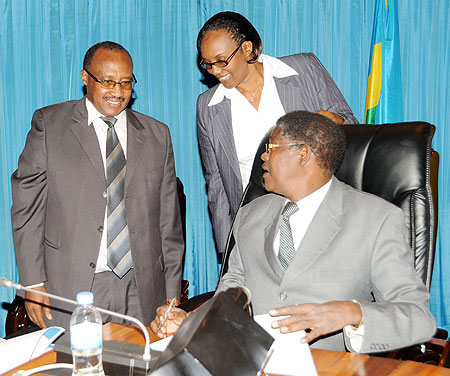KIMIHURURA-The Access to Information Bill, yesterday, moved past the preliminary hurdle in the Chamber of Deputies as members overwhelmingly backed the document, in principal, agreeing to forward it to a parliamentary standing committee for a detailed scrutiny. Many MPs pointed out that the draft legislation, once enacted into law, will help boost the country’s good governance indicators by enforcing accountability.


KIMIHURURA-The Access to Information Bill, yesterday, moved past the preliminary hurdle in the Chamber of Deputies as members overwhelmingly backed the document, in principal, agreeing to forward it to a parliamentary standing committee for a detailed scrutiny.
Many MPs pointed out that the draft legislation, once enacted into law, will help boost the country’s good governance indicators by enforcing accountability.
Connie Bwiza noted that it is timely, adding that it must become a culture for leaders and others to provide information as required.
"My view is that giving information is in fact a responsibility of a leader – because if we believe in transparency, accountability and good governance, information is very important,” Connie Bwiza said.
As she moved a vote of thanks to government for tabling the bill, she equally highlighted the significance of "shared information and shared knowledge,” which she said enhances good governance.
Information Minister Protais Musoni who tabled the bill, acknowledged this, noting that government wants it to be an obligation for leaders since it also helps them accomplish their other duties.
MP Charles Kamanda particularly poured scorn on some public officials, and others, who he noted, deny access to information to journalists and even members of the public, often pretending to be too busy.
"You hear people say that: ‘I am in a meeting, I will call you later’, but they don’t call back. This is really something that leaders should think about,” Kamanda said.
Meanwhile, the bill’s article 4 notes that some information may be withheld by a public organ or certain classes of private bodies if it, among other things, it causes harm to national security; or impedes the due process of the law or impedes justice.
The clause can also be applied where "exempt information” may involve the unwarranted invasion of privacy of an individual; or violates the legitimate protection of secrets or other intellectual property right protected by law and other laws.
Several journalists have welcomed the new media bills and expressed hope that if everything goeswell, it will be a big achievement for the media industry.
The house approved the preamble of the legislation and sent it to the concerned committee for further scrutiny.
This puts to four, the laws related to the media that have been discussed this week.
They include the Media Law, and bills on the functioning and organisation of the Media High Council (MHC), as well as the one concerning the Rwanda Broadcasting Agency (RBA).
Jean Bosco Gatete, of local vernacular newspaper, Umurinzi, is particularly happy that the access to information bill was separated from others.
"Before, it was part of the media law. That is a very good step and it will make leaders desist from the bad habit of refusing to divulge information,” Gatete said, adding that the introduction of the RBA to replace the current ORINFOR is a good move.
Ends


